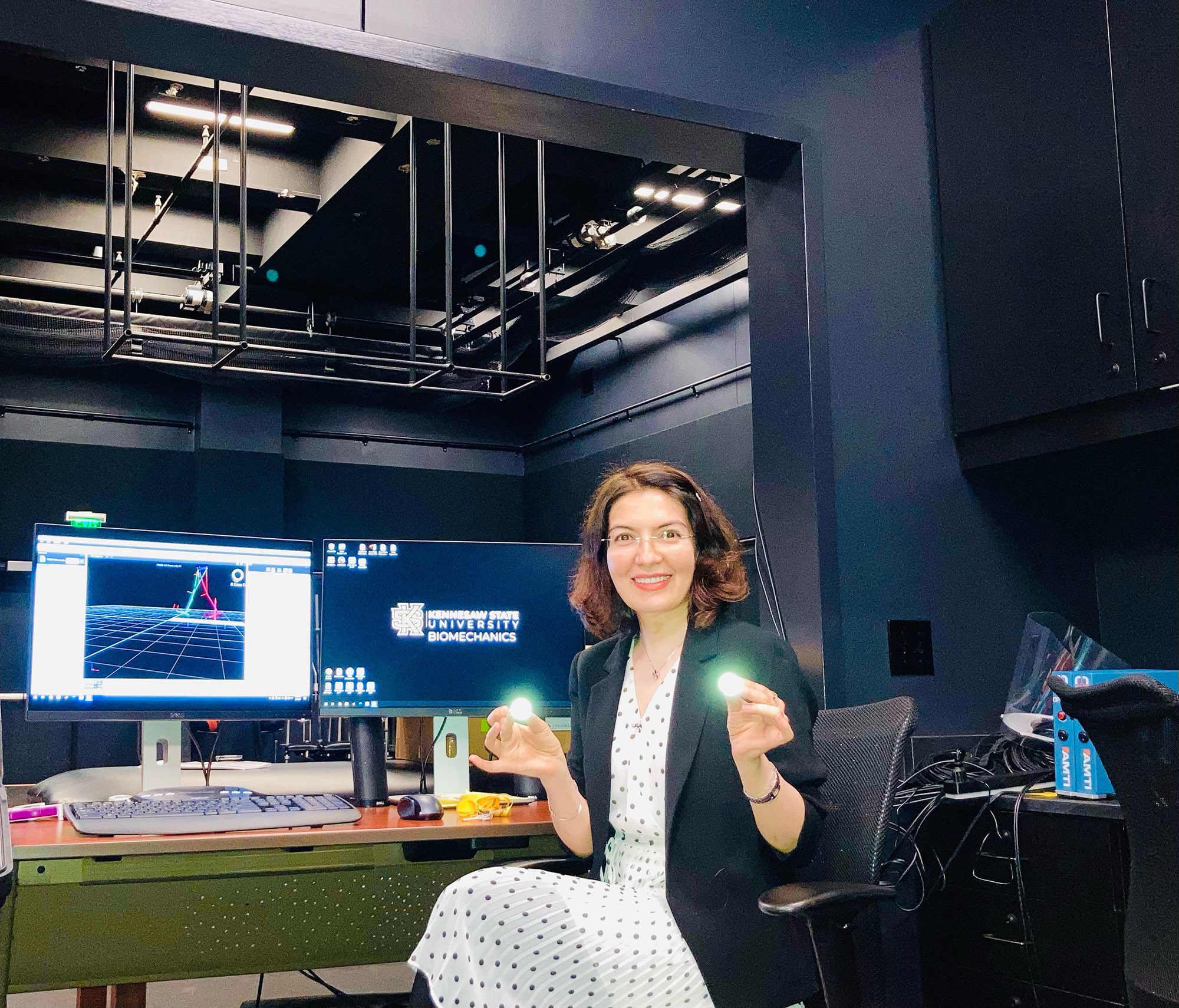Postdoctoral researcher brings clinical experience to KSU’s Biomechanics Lab
KENNESAW, Ga. (May 27, 2021) — After watching her mother rehabilitate disabled patients as a physical therapist in Iran, Leila Rahnama knew she also wanted to help people as a physical therapy clinician.
Today, Rahnama is a postdoctoral researcher in Kennesaw State University’s Department of Exercise Science and Sport Management in the Wellstar College of Health and Human Services. She is currently working with Mark Geil, department chair and professor of exercise science, as they try to create solutions for children who suffer from Idiopathic Toe Walking (ITW) and present gait abnormalities, conditions they believe to be related to sensory processing issues.
“My area of research interest is finding innovative ways to treat and manage musculoskeletal conditions. Currently, this team works with children who walk on their toes,” she said. “We are trying to find and introduce an innovative way to treat irregular gait patterns in children, and we hope to make that solution as simple and comfortable as possible for the patients.”
One of the proposed solutions they’re working on is the use of a simple shoe insert that would immediately begin correcting a child’s walk as a discreet treatment option. Rahnama notes that while for many of these children the condition is not initially painful, the cosmetic and social impact of the problem could create an emotional disparity for those suffering from the condition. By treating these children, Rahnama and Geil are able to contribute to the improvement of their future mental health and confidence.
“They are much more resilient and adaptable than we give them credit for, and they can accomplish things that we wouldn’t expect them to accomplish,” Geil said. “It’s very rewarding to work with them and see that you can make a difference in their lives at such a young age.”
Before partnering with Geil, Rahnama had spent most of her career working with adult patients suffering from musculoskeletal injuries and lacked extensive experience in applied pediatric care. She received a Master of Science degree in physical therapy from the University of Social Welfare and Rehabilitation Sciences (USWR) in Tehran, Iran before continuing her studies and earning a Ph.D. from the Shahid Beheshti University of Medical Sciences.
Rahnama went on to pursue her first postdoctoral research position at Linkoping University in Sweden where she focused on muscle speckle tracking using ultrasonography. She also served as an assistant professor of physical therapy at USWR for five years where she supervised several studies on musculoskeletal conditions. Eventually, she ended up in the United States at another institution before landing her postdoctoral position at KSU.
“After moving to the U.S., I started my career at the University of North Georgia as a visiting scholar, and it was there that I felt the need to expand my knowledge of biomechanics and human performance. As a researcher I always try to stay updated on scientific literature and publications,” Rahnama recalled. “Through those readings I became more and more interested in the work of Dr. Geil and began accumulating extensive research background in human gait and biomechanics before eventually applying for this position.”
Since coming to KSU in January 2020, Rahnama has expanded her knowledge of research and gained proficiency in the operation of motion analysis systems used in the Biomechanics Laboratory. As a part of her postdoctoral research, she has conducted large-scale data analysis and collection, written her first National Institutes of Health grant proposal, co-written many conference abstracts and journal articles, and prepared posters and ancillary video presentations.
Rahnama recently received an award from the National Postdoctoral Association and accepted an invitation to present as a speaker at the World Physiotherapy Congress 2021.
“I am a huge advocate for postdoctoral researchers and the ability to have someone who is experienced and trained throughout the process of conducting a dissertation and completing independent research,” Geil said. “Her work is almost exclusively dedicated to conducting research, so she is an asset. It is a huge relief to have someone on your team who is able to see projects through and overcome the unexpected challenges that frequently arise in research.”
In the future, Rahmana hopes to be a leader of her own interdisciplinary research team that will focus on creating clinical applications from laboratory research. She believes her experiences observing Geil and receiving mentorship from this position will assist her in becoming an effective leader as well as a skilled research professional who can create a meaningful impact with her scholarship.
“I’m very passionate about finding the clinical benefits of research and using those findings to improve the health of people across the globe,” she said.
– Dorothy Corbett












